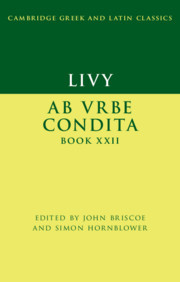Description
Livy: Ab urbe condita Book XXII
Cambridge Greek and Latin Classics Series
Coordinators: Briscoe John, Hornblower Simon
Treats a compelling narrative of two of history's most famous battles, and assists translation and literary and historical appreciation.
Language: English
Livy: Ab urbe condita Book XXII
Publication date: 10-2020
320 p. · 13.6x21.5 cm · Paperback
Publication date: 10-2020
320 p. · 13.6x21.5 cm · Paperback
Livy: Ab urbe condita Book XXII
Publication date: 10-2020
380 p. · 14.3x22.2 cm · Hardback
Publication date: 10-2020
380 p. · 14.3x22.2 cm · Hardback
Description
/li>Contents
/li>Biography
/li>
Livy's Ab urbe condita Book XXII narrates Hannibal's massive defeats of the Romans at Trasimene (217 BC) and Cannae (216 BC). It is Livy's best and most dramatic book, and the one most likely to appeal to students at every level. Livy drew on the Greek historian Polybius, but transformed his drier treatment into a rhetorical masterpiece, which by a series of insistent thematic contrasts brings out the tensions between the delaying tactics of Fabius and the costly rashness of Flaminius, Minucius and Varro. A substantial and accessibly written introduction by two experienced commentators covers historical, religious, literary and linguistic matters, including the place of Book XXII in the structure of Livy's long work. A new text by Briscoe is followed by a full commentary, covering literary and historical aspects and offering frequent help with translation. The volume is suitable for undergraduates, graduate students, teachers, and scholars.
Introduction; 1. Livy's life and work; 2. Course of the war; 3. Sources; 4. Structure; 5. Chronology; 6. Language and style; 7. Literary aspects; 8. Religion in Livy; 9. Roman politics and Fabian strategy; 10. Manpower; 11. The text; Livy Book XXII; Commentary.
John Briscoe spent his academic career at Corpus Christi College, Oxford and the University of Manchester, where he is an Honorary Research Fellow. He is a Member of the Academia Europaea. He has published four volumes of commentary on Livy books 31-45 (1973–2012), and critical editions of books 21-25 (2016) and 31-45 (1986–1991); Liviana (2018) is a companion volume to the OCT. He has also published a critical edition of Valerius Maximus (1998) and a commentary on book 8 (2019). He made substantial contributions to Fragments of the Roman Historians (ed. T. J. Cornell, 2013).
Simon Hornblower lives and works in London. He began and ended his academic career in research posts at All Souls College Oxford (1971–77, 2010–16). In between, he taught at the University of Oxford and then at University College London, where he was Professor of Classics and Grote Professor of Ancient History. He has written, edited, or co-edited twenty-two books, most recently editions of Books V and VI of Herodotus for Cambridge Greek and Latin Classics (2013 and 2017 respectively), Lykophron Alexandra: Greek Text, Translation, Commentary and Introduction (2015), Lykophron's Alexandra, Rome, and the Hellenistic world (2018), and The Returning Hero: Nostoi and traditions of Mediterranean settlement (co-edited, 2018).
Simon Hornblower lives and works in London. He began and ended his academic career in research posts at All Souls College Oxford (1971–77, 2010–16). In between, he taught at the University of Oxford and then at University College London, where he was Professor of Classics and Grote Professor of Ancient History. He has written, edited, or co-edited twenty-two books, most recently editions of Books V and VI of Herodotus for Cambridge Greek and Latin Classics (2013 and 2017 respectively), Lykophron Alexandra: Greek Text, Translation, Commentary and Introduction (2015), Lykophron's Alexandra, Rome, and the Hellenistic world (2018), and The Returning Hero: Nostoi and traditions of Mediterranean settlement (co-edited, 2018).
© 2024 LAVOISIER S.A.S.





